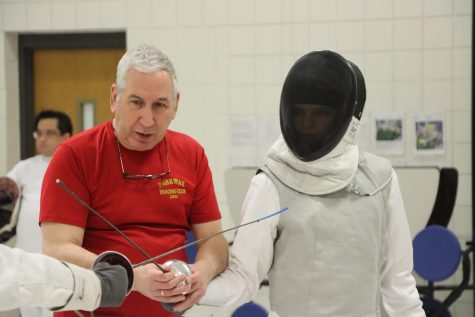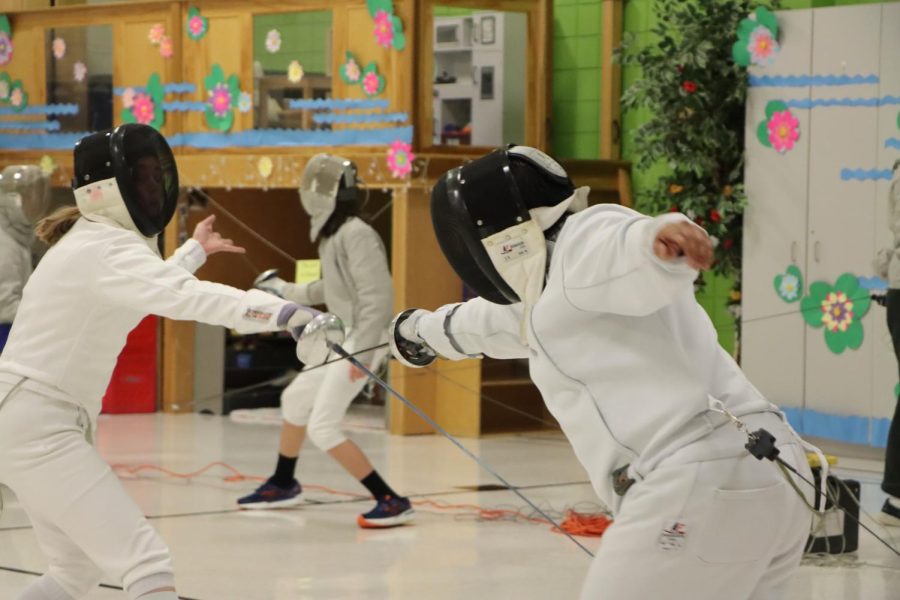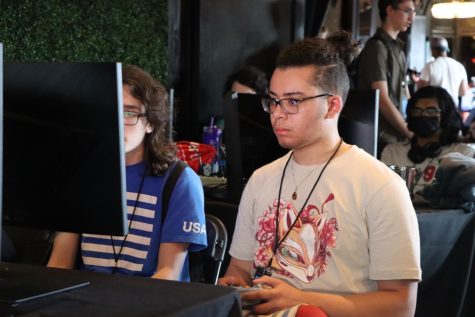Parkway-Rockwood Offers Fencing
Media by Shyam Punnachalil
Elizabeth Lawless (left), senior, fences against Dennis Yang (right), a club member, on Wednesday, March 1, at Ellisville Elementary School during a practice. Lawless has been fencing since her middle school years and enjoys the strategy needed to fence. “It’s all about reading your opponent, like tricking them out and getting into their heads,” Lawless said.
It may come as a shock to some that Elizabeth Lawless, senior, spends her Monday and Wednesday evenings sword fighting at Ellisville Elementary School. Lawless’ swashbuckling efforts are part of her being a member of the Parkway Fencing Club apart of the Parkway-Rockwood Community-Ed organization
Fencing has been around since the 15th century, and has been an Olympic sport since 1896. In the United States, fencing is very popular in the east coast, and is gaining some popularity in Missouri. People can join the Parkway Fencing Club after joining beginner and intermediate fencing classes. If they pass, then they can join the club.
Lawless began fencing when she was in middle school after seeing an advertisement for the team.
“I was like ‘oh that sounds fun’,” she said. “Why not give it a try?”
As time progressed, Lawless learned more and more about the sport.
“Etiquette is surprisingly important in fencing,” Lawless said. “Most people you encounter are really respectful and fun to talk to, and I’ve come to see [fencing] as more of a giant learning experience than trying to beat anyone I can.”
My goals are to teach people fencing, to enjoy it, get physical activity, and learn good sportsmanship,
— Rick Valvero
Lawless also discovered something about herself. Because fencing is an individual sport, Lawless said she noticed her self-confidence steadily improve.
“It has allowed me to be really independent,” she said.
Last summer, Lawless won a gold medal for the fencing event at the Show-Me State Games.
In that event and others, she looks for ways to trick and defeat her opponents.

“I’ll be defensive for a little bit to gauge what they do and understand what their movement speed is like and any patterns I can take advantage of,” Lawless said.
Lawless said playing mind games against the opponent is important in order to be successful.
“I’d say fencing is as much a mind game as it is a combat sport,” she said. “Getting into your opponent’s mind is especially important.”
Audrey McGhee, freshman, also fences for the Parkway Fencing Club. She appreciates the community aspect of fencing, and enjoys how fencing is pretty much sword fighting.
“We have really good coaches, and it’s a lot of fun,” she said.
McGhee, along with Lawless, said she wishes MHS had a fencing team.
Rick Valvero, fencing coach for the Parkway Fencing Club, said fencing is a sport that takes immense skill in one’s movement and reaction but is also inclusive for those who aren’t great at team sports.
“What I like the most about it is getting kids who don’t think they’re athletic or great at sports come in with low self-esteem and learn and understand that they can do this,” Valvero said.
I’d say fencing is as much a mind game as it is a combat sport,” she said. “Getting into your opponent’s mind is especially important.
— Elizabeth Lawless
Valvero coaches both Lawless and McGhee and enjoys taking a bigger role in their fencing journey.
“I treat my players like they’re my kids,” Valvero said. “I’m part cheerleader, part technical adviser, part-nutritionist, part armorer, and part counselor. It’s just fun.”
Valvero wants to teach his players lessons beyond the idea of winning matches.
“My goals are to teach people fencing, to enjoy it, get physical activity, and learn good sportsmanship,” Valvero said.
Your donation will support the student journalists of Marquette High School. Your contribution will allow us to purchase equipment and cover our annual website hosting costs. You may become a PATRON by making a donation at one of these levels: White/$30, Green/$50, Blue/$100. Patron names will be published in the print newsmagazine, on the website and once per quarter on our social media accounts.

Shyam Punnachalil, senior, is an Associate Producer for MHSNews and a Sports Editor The Marquette Messenger. This is Shyam's third year in MHSNews, and...

Liza Cooper, senior, is the Opinions Editor for the Marquette Messenger. This is her third year on staff. Liza loves to travel, take pictures, and be with...

Cassie Sun, senior, is the Executive Producer of MHSNews. She's covered anything from bookstores to bee farms and is passionate about bringing visibility...








